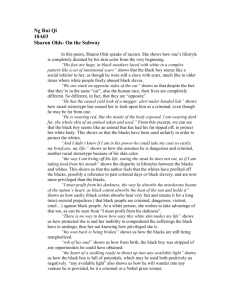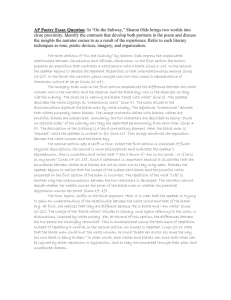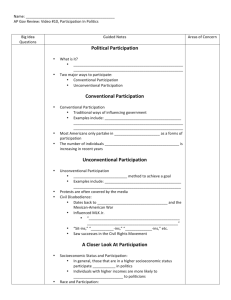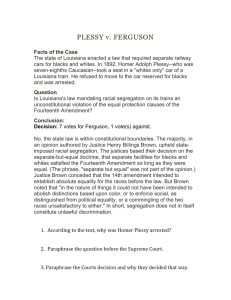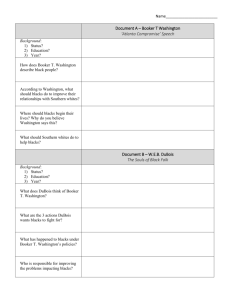journal
advertisement
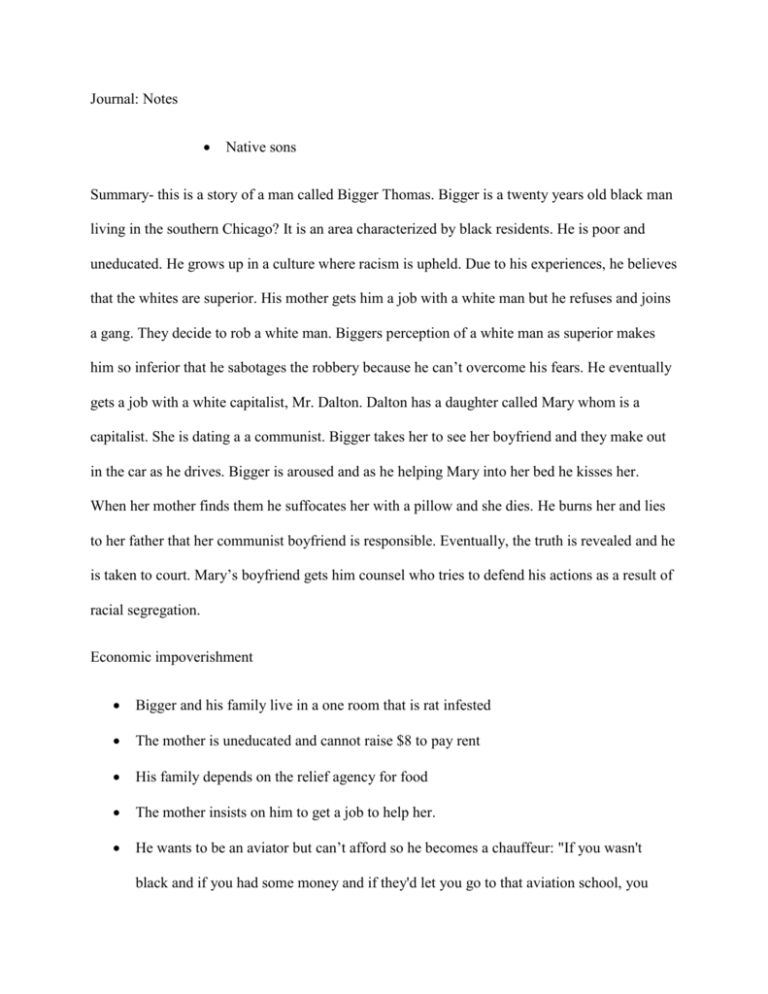
Journal: Notes Native sons Summary- this is a story of a man called Bigger Thomas. Bigger is a twenty years old black man living in the southern Chicago? It is an area characterized by black residents. He is poor and uneducated. He grows up in a culture where racism is upheld. Due to his experiences, he believes that the whites are superior. His mother gets him a job with a white man but he refuses and joins a gang. They decide to rob a white man. Biggers perception of a white man as superior makes him so inferior that he sabotages the robbery because he can’t overcome his fears. He eventually gets a job with a white capitalist, Mr. Dalton. Dalton has a daughter called Mary whom is a capitalist. She is dating a a communist. Bigger takes her to see her boyfriend and they make out in the car as he drives. Bigger is aroused and as he helping Mary into her bed he kisses her. When her mother finds them he suffocates her with a pillow and she dies. He burns her and lies to her father that her communist boyfriend is responsible. Eventually, the truth is revealed and he is taken to court. Mary’s boyfriend gets him counsel who tries to defend his actions as a result of racial segregation. Economic impoverishment Bigger and his family live in a one room that is rat infested The mother is uneducated and cannot raise $8 to pay rent His family depends on the relief agency for food The mother insists on him to get a job to help her. He wants to be an aviator but can’t afford so he becomes a chauffeur: "If you wasn't black and if you had some money and if they'd let you go to that aviation school, you could fly a plane," Gus said. For a moment Bigger contemplated; then both boys broke into hard laughter He is stunned by the wealth of the Daltons. Class conflict Bigger and his friends plan to rob a white Bigger fears the white force and he attacks his gang member to sabotage the plans. Mary and max hide while associating with the blacks communists. He does not receive fair trial for the murder case. It is in the interest of the powerful whites His mother insists that he gets a job so that their living standards could improve. White are portrayed as cultured, rich and attractive. Blacks are impoverished servants. There is Joblessness in the southern Chicago where the blacks live. Pursuit for power There are two groups of people, powerful and powerless in the book. Ma tries to influence the son to get a job to increase their resource power so that they can live a better life. Daltons pretend to care through philanthropies yet it is a scheme to advance their power quest by overpricing the housing in the south. The whites use the justice system against the blacks to advance their power as the superior race. Bigger uses his power to intimidate others. The woman on the bed continued to sob. Bigger took a piece of newspaper and gingerly lifted the rat by its tail and held it out at arm’s length. "Bigger, take ‘im out," Vera begged again. Bigger laughed and approached the bed with the dangling rat, swinging it to and fro like a pendulum, enjoying his sister’s fear. "Bigger!" Vera gasped convulsively; she screamed and swayed and closed her eyes and fell headlong across her mother and rolled limply from the bed to the floor. "Bigger, for God’s sake!" the mother sobbed, rising and bending over Vera. "Don’t do that! Throw that rat out!" (1.66-70) Uncle toms children Summary- it is a combination of six stories. First is, the Ethics of Living Jim Crow. It is a description of racial segregation of the black people. Wright narrates his experience and the rejection he faces as a child while playing with white children. as a young man he is despised by his colleagues and they beat him up when he attempts to learn new skills on his work. He is annoyed by the way the black youths are treated. They have to work in the presence of naked white prostitute but they are not allowed to touch them. Any attempt to sexually relate with the whites results in castration. On the contrary, white men exploit black women sexually. The blacks are forced to remain silent in the presence of the whites because any words they utter could be used against them. Even saying thank you can be reason for punishment. Second, big boy leaves home. This is a story of a boy with his three friends. They are living at a time when racism is prevalent. The four boys decide to swim in a white man’s swimming pool. As they do so, the white man’s wife finds them and she screams for help. Her husband responds to the cries with a rifle in his hand. He shoots two of the boys and they die. Big boy grabs the gun and he shoots the white army man. He escapes with his friend Bobo. Their families arrange for them to escape and they send them to a hide out. Before Bobo can get to the hideout, he is captured and beaten to death by a mob. Big boy witnesses the incident and it scares him. The story ends as big boy is contemplating about his friends` deaths. Third, is down by the riverside. This is a story about a man called Mann. A flood occurs and Mann has to secure his expectant wife, his son and her mother to the hills. He does not have a boat and he resolve to selling his donkey to obtain money to buy a boat. His wife goes into labor and it requires taking her to the hospital. He gets a boat and they set out for the hills. When he gets to the first house at the hills, he calls for help but the owner responds with gunshots. Mann shoots the house owner. By the time he reaches the hospital, his wife and the unborn baby die. The soldiers escort him and his mother in law away. Mann and a black boy are called to help evacuate a family which turns out to be the family of the man he killed. The small boy in that family recognizes him and is about to shout at his sight but Mann raises his axe to hit him. The floods shake the house and he stops. When they get to safety, the young boy identifies Mann as his father’s killer. The soldier catches Mann and as he tries to flee they shoot him dead. Fourth is the Long Black Song. This is the story of a black couple named Silas and Sarah. Silas is a framer. Sarah is not sure about her love for silas because she has feelings for another man. A white man comes into her home to sell recorders. Sarah falls for him and they have sex on her bed. When Sila realizes that Sarah has been unfaithful with a white man he beats her up and fights with the white man. He eventually kills the white man. A crowd of white people gang up against him and they burn him for his action. Fifth is fire and cloud. This is the story about reverend Taylor. It starts with him thinking about the good old days when there was plenty; the thought is triggered by the problems the blacks are going through. The blacks are organizing a march against the racial segregation by the whites. They need reverend Taylor to endorse their march so that there can be a high turnout. Taylor is skeptical about it because he sees that if he endorses the march against the rich and powerful whites, they will never give him anything for his people. The pro-marching team meets him and at the same time the mayor comes to ask him not to endorse the march. He decides to share the information with the deacons. Deacon Smith informs on him and the white beat Taylor up. As a result Taylor endorses the marching. The pain of the beating is the fire while the marching crowded is the fire cloud like the one God used to lead the Israelites out of Egypt. Sixth is bright and morning star. This is a story about an old lady called sue. It starts as Sue is waiting for her son to come home as she reflects on how faith in God helped her to overcome the feeling of oppression caused by the racial segregation. The whites oppress the blacks and it leads sue and her sons to join the communist party. One of her son is jailed for communism. The other son Johnny boy is an organizer of communist activities. As sue is sited outside her house reflecting, Reva a white communist comes and informs her that there is a sheriff informer among the communists. She tells him that the sheriff is aware of a planned communist meeting. When her son comes sue tells him to inform the comrades. The sheriff comes when her son leaves. He tries to make her to give up information on the communist but she does not. He beats her up and tells her to carry a sheet to bury her son’s body. He is accompanied by booker the informer. Sue wraps a gun in a sheet and she goes to look for her son. She finds him in the forest as the sheriff is torturing him. When booker appears, she shoots him dead. The sheriff’s guards shoot Sue and her son. She dies in content as she has fulfilled her purpose of protecting her fellow communists. Economic impoverishment Wright lives in the south the only place where the poor blacks can afford. Wright works as a bellboy in a hotel and he has to withstand the nakedness of the white prostitutes since it is his only means of livelihood. Mann in down by the river side wants to move his family to safety but he cannot afford a boat. He sells his donkey to afford one. Mann takes his wife to the Red Cross hospital since it is the only place he can afford. When Sarah’s baby cries, she gives her an old broken clock to play with since it is all she can afford as a toy. The white man who comes to sell his ware to Sarah sees that she is hesitating to buy the clock. He assures her that she can buy the clock in Reverend Taylors congregation depends on relief food for survival. Taylor does not want to disappoint the whites because they may cut the aid they offer to his people Pursuit for power When they reached the park that separated the white district from the black, the poor whites were waiting. Taylor trembled when he saw them join, swelling the mass that moved toward the town. He looked ahead and saw black and white marching; he looked behind and saw black and white marching... Invisible man Summary-Invisible man is the story narrated in first person. The narrator says he is invisible because people have refused to see him. He is living in the underground. He is a black young man who is gifted with public speaking skills. He is invited to make a speech presentation to a group of white men who offer him a scholarship. They mock him and other black men before giving him the scholarship. While at the college, he is assigned the task of driving one of the college trustees, Mr. Norton, around the college. He talks of a black man who impregnated his daughter and this gives him an urge to drink. The narrator takes him to a black joint. A fight occurs and Norton faints. The narrator is chastised and expelled by the school president. He is given letters of recommendation and sent to New York. He is unable to find a job in because the letters give describe him in a negative manner. He meets Mr. Emerson’s son who helps him to get a job in a paint manufacturing company. He is an assistant to Brockway. One time they argue and fight and the paint tank explodes on them. The narrator is taken to the hospital. When the doctors see him they choose to conduct experiments on him since he is a black man. After he recovers, some blacks take him to Harlem where he lives with Mary. He gets an opportunity to exercise his public speaking skills as he condemns the eviction of an elderly black couple. The black’s brotherhood notices him and he is recruited into the group. In the group he faces opposition from some leaders and he gets into trouble many times. One time he is called to go to Harlem, he arrives to find people rioting after being incited by one of his brotherhood enemies, Ras. He gets involved in the riot by lighting a house. As he is running from the scene, he meets Ras who incite the mob to lynch him. He runs from the mob only to meet with the police. They suspect that he is handling stolen goods and they chase after him. He falls into a manhole as he is running. The police think he will die there and they cover it instead of helping him out. From that day, he lives in the underground. Towards the end of the story he sees that he should not abandon his responsibility to his community. He should stand for his black identity. For him it is time to resume his duty as a member of the black community. Economic impoverishment The narrator lives in the south. It is the only place the blacks can afford to reside. The narrator is humiliated before he is offered the scholarship. He with stands the humiliation because he knows it is his only chance. After the college expulsion, he finds himself naked and helpless in that modern city-ofthe-plain, New York, After his hospital ordeal, he lives in Harlem with Mary. Harlem is a poor neighborhood for blacks. At Harlem an elderly couple is evicted from their house for failure of paying rent. Class conflict Blacks have to play by the white man’s rules. The brotherhood struggles to stand up for the black man I the racist society but internal wrangles hinder them. The narrator figures out from underground that time has come for him to rise. Meaning time has come for the invisible blacks to take their place in the society. The narrator struggles to end individual oppression through his public speaking skills and he attempts to liberate other members of his community. Pursuit for power I am invisible; understand, simply because people refuse to see me. (Prologue.1). the narrator wants to rise from the underground and become visible. That is why I fight my battle with Monopolated Light & Power. The deeper reason, I mean: It allows me to feel my vital aliveness. I also fight them for taking so much of my money before I learned to protect myself (Prologue.7) "Tell anyone you like," he said. "I don't care. I wouldn't raise my little finger to stop you because I don't owe anyone a thing, son. Who, Negroes? Negroes don't control this school or much of anything else – haven't you learned even that? No sir, they don't control this school, nor white folk either. True they support it, but I control it. It's big and black and I say 'Yes, suh' as loudly as any burr head when it's convenient, but I'm still the king down here. I don't care how much it appears otherwise. Power doesn't have to show off. Power is confident, self-assuring, self-starting and self-stopping, self-warming and self-justifying. When you have it, you know it. Let the Negroes snicker and the crackers laugh! Those are the facts, son. The only ones I even pretend to please are big white folks, and even those I control more than they control me. This is a power set-up, son, and I'm at the controls. You think about that. When you buck against me, you're bucking against power, rich white folk's power, the nation's power – which means government power!" (6.73) But more than that, he was the example of everything I hoped to be: Influential with wealthy men all over the country; consulted in matters concerning the race; a leader of his people; the possessor of not one, but two Cadillacs, a good salary and a soft, goodlooking and creamy-complexioned wife. What was more, while black and bald and everything white folks poked fun at, he had achieved power and authority; had, while black and wrinkle-headed, made himself of more importance in the world than most Southern white men. They could laugh at him but they couldn't ignore him… (4.14) I'm still the king down here. I don't care how much it appears otherwise. Power doesn't have to show off. Power is confident, self-assuring, self-starting and self-stopping, selfwarming and self-justifying. When you have it, you know it. . . . When you buck up against me, you're bucking up against power, rich white folk's power, the nation's power-which means government power. (142) The bourgeoisie is unfit any longer to be the ruling class of society, and to impose its conditions of existence upon society as an over-riding law. It is unfit to rule because it is incompetent to assure an existence to its slave within his slavery, because it cannot help letting him sink into such a state, that it has to feed him, instead of being fed by him. Society can no longer live under this bourgeoisie, in other words, its existence is no longer compatible with society. (Marx, Communist Manifesto 93) Black boy Summary- black boy is the story of Richard writs childhood and struggle with racism. It starts with Richard accidentally setting his grandmother’s house on fire. He is surrounded by irresponsible men who do not take proper care of their families. The female in his life are highly religious. Richard chooses his own path of empowering himself with education. Despite the racial hindrances and his discouraging family, he is determined to excel in education. He excels in writing and he is employed in various places due to his ability to write creatively. He handle many jobs, some are not related to his writing career. At one time when he is working in an optics shop, he is fired for being too knowledgeable in his work. The fellow employees claim that such apposition should not be held by a black man. Due to the frustrations of racism, Richard decided to join communism. He sees it as a platform for freeing the oppressed. He believes that his excellent writing skills will be beneficial in the party. He is keen to correct the party pronouncement and it affects mutual trust between him and the members. He is eventually forced out of the party and physically assaulted. It demoralizes him from writing and using his skills to connect with the world. I dreamed of going North and writing books, novels. The North symbolized to me all that I had not felt and seen; it had no relation whatever to what actually existed.... I was building up in me a dream which the entire educational system of the South had been rigged to stifle. I was feeling the very thing that the state of Mississippi had spent millions of dollars to make sure I would never feel; I was becoming aware of the thing that the Jim Crow laws had been drafted and passed to keep out of my consciousness The kitchenette is our prison, our death sentence without a trial, the new form of mob violence that assaults not only the lone individual, but all of us, in its ceaseless attacks.... The kitchenette, with its filth and foul air, with its one toilet for thirty or more tenants, kills our black babies so fast that in many cities twice as many of them die as white babies. The kitchenette scatters death so widely among us that our death rate exceeds our birth rate, and if it were not for the trains and autos bringing us daily into the city from the plantations, we black folk who dwell in the northern cities would die out entirely.... The kitchenette blights the personalities of our growing children, disorganizes them, blinds them to hope, creates problems whose effects can be traced in the characters of its child victims for years afterward...the kitchenette piles up mountains of profits for the Bosses of the Buildings and makes them ever more determined to keep things as they are...the kitchenette is the funnel through which our pulverized lives flow to ruin and death on city pavements, at a profit....4 ...In many large cities there were sturdy minorities of us, both black and white, who banded together in disciplined, class-conscious groups and created new organs of action and expression. We were able to seize nine black boys in a jail in Scottsboro, Alabama, lift them so high in our collective hands, focus such a battery of comment and interpretation upon them, that they became symbols to all the world of the plight of black folk in America.
